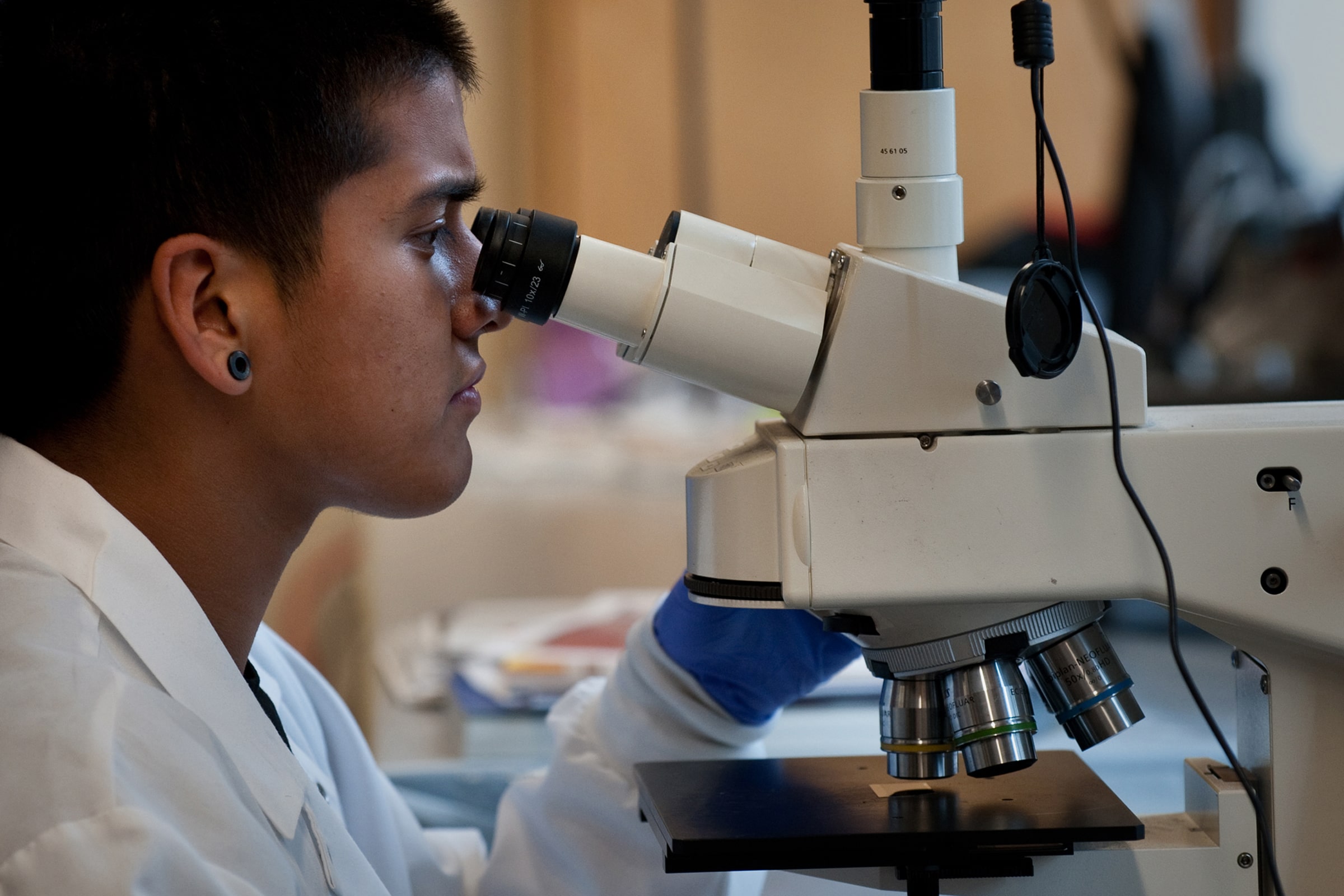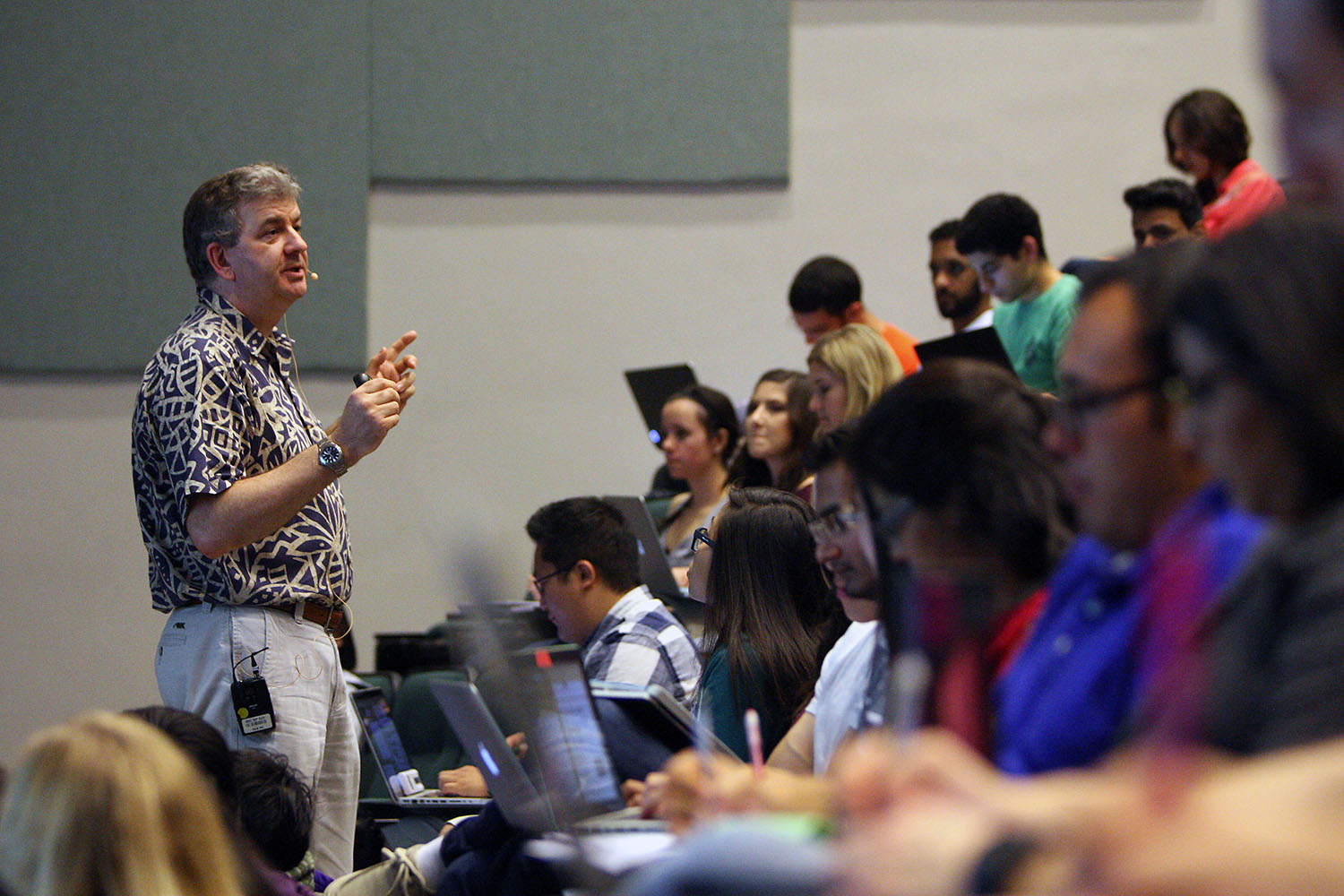Undergraduate Major in Developmental and Cell Biology
Developmental and Cell Biology Major: The disciplines of Developmental and Cell Biology examine the progression of gametes from before fertilization, through fertilization, and then throughout morphogenesis as the fertilized egg forms its organs and eventually becomes and adult organism, beginning the cycle again. A thorough understanding of these disciplines is essential to uncover the causes of birth defects, of human diseases and of the developmental origins of disease. This understanding will facilitate the development of new therapeutic approaches to cure diseases such as cancer and neurological disorders, and the exploration of new therapies through regenerative medicine. These areas of biology have been undergoing significant transformation in recent years. The faculty advisors for the major interact closely with students, providing mentoring and career advice customized to individual students during their junior and senior years. The major will enable students to bridge different sub-disciplines so that they will be best prepared for success in careers such as research, biotechnology, medicine/dentistry/pharmacy and public policy.
University and School Requirements
All students must meet the University Requirements.
All students must meet the School Requirements.
Major Requirements
| A. Required Major Courses: | |
| BIO SCI D103 | Cell Biology |
| BIO SCI D104 | Developmental Biology |
| BIO SCI D114 | Developmental and Cell Biology Majors Seminar |
| BIO SCI D145 | Genomics, Development, and Medicine |
| B. Upper-Division Laboratories: | |
| BIO SCI D111L | Developmental and Cell Biology Laboratory |
| and select two of the following: 1 | |
| Habitats and Organisms | |
| Physiology Laboratory | |
| Evolution Laboratory | |
| Image Analysis in Biological Research | |
| Evolution and the Environment Laboratory | |
| Biology of Birds Lab | |
| Field Biology | |
| Field Freshwater Ecology | |
| Biochemistry Laboratory | |
| Molecular Biology Laboratory | |
| Experimental Microbiology Laboratory | |
| Advanced Immunology Laboratory | |
| Virology and Immunology Laboratory | |
| Advanced Molecular Lab Techniques | |
| Neurobiology Laboratory | |
| C. Upper-Division Biology Electives: | |
| Select one of the following: | |
| Human Anatomy | |
| Eukaryotic and Human Genetics | |
| Development and Disease | |
| Applied Human Anatomy | |
| and select one of the following: | |
| Advances in Regenerative Medicine | |
| Cell Biology of Human Disease | |
| Topics in Developmental and Cell Biology | |
| Signal Transduction in Mammalian Cells | |
| Cell Organelles and Membranes | |
| and select three of the following: | |
| Cell, Developmental, and Molecular Biology of Plants | |
| Photomedicine | |
| Introduction to Precision Medicine | |
| Advances in Regenerative Medicine | |
| Human Anatomy | |
| Eukaryotic and Human Genetics | |
| Critical Thinking in Cell Biology | |
| Development and Disease | |
| Applied Human Anatomy | |
| Human Physiology | |
| Comparative Vertebrate Anatomy | |
| Advanced Biochemistry | |
| Advanced Molecular Biology | |
| Molecular Biology of Cancer | |
| Microbial Genetics | |
| Human Parasitology | |
| Cell Organelles and Membranes | |
| Neurobiology and Behavior | |
| Neurobiology of Aging | |
| Neuropharmacology | |
| Molecular Neurobiology | |


Undergraduate Major in Genetics
Genetics is an inescapable part of modern society; it features in intellectual news articles and popular talk shows, in discussions of topics from health care to reproductive cloning, in conversations about how CRISPR genome modification will change life as we know it, to how much Neanderthal DNA you have. With human genome sequencing widely available, it is more important now than ever for biology students to have a broad background in the study of heredity and evolution. The Genetics major enables undergraduates interested in molecular, developmental, and evolutionary genetics to explore how genetic mechanisms contribute to understanding human development and disease. Genetics majors in their Junior and Senior years meet with faculty advisors who help plan their curricula, select appropriate Bio 199 research labs and provide career advice. The Genetics major provides training in the skills necessary to pursue graduate degrees in biomedical research, teacher-training programs, medical school, and veterinary school. Genetics majors may also use their backgrounds effectively in planning careers in law, business, education, and public affairs.
University and School Requirements
All students must meet the University Requirements.
All students must meet the School Requirements.
Major Requirements
Major Requirements
| A. Required Major Courses: | |
| BIO SCI D103 | Cell Biology |
| BIO SCI D104 | Developmental Biology |
| BIO SCI D113 | Genetics Majors Seminar |
| B. Upper-Division Laboratories: | |
| Select three of the following: 1 | |
| Developmental and Cell Biology Laboratory | |
| Habitats and Organisms | |
| Physiology Laboratory | |
| Evolution Laboratory | |
| Image Analysis in Biological Research | |
| Evolution and the Environment Laboratory | |
| Biology of Birds Lab | |
| Field Biology | |
| Field Freshwater Ecology | |
| Biochemistry Laboratory | |
| Molecular Biology Laboratory | |
| Experimental Microbiology Laboratory | |
| Advanced Immunology Laboratory | |
| Virology and Immunology Laboratory | |
| Advanced Molecular Lab Techniques | |
| Neurobiology Laboratory | |
| C. Upper-Division Biology Electives: | |
| Select two of the following: | |
| Introduction to Precision Medicine | |
| Eukaryotic and Human Genetics | |
| Genomics, Development, and Medicine | |
| Development and Disease | |
| Microbial Genetics | |
| Select one from the following: | |
| Advances in Regenerative Medicine | |
| Cell Biology of Human Disease | |
| Eukaryotic and Human Genetics | |
| Development and Disease | |
| Functional and Structural Evolutionary Genomics | |
| Developmental Neurobiology | |
| Select three from the following: | |
| Cell, Developmental, and Molecular Biology of Plants | |
| Photomedicine | |
| Human Anatomy | |
| Critical Thinking in Cell Biology | |
| Applied Human Anatomy | |
| Topics in Developmental and Cell Biology | |
| Human Physiology | |
| Advanced Biochemistry | |
| Advanced Molecular Biology | |
| Signal Transduction in Mammalian Cells | |
| Molecular Biology of Cancer | |
| Human Parasitology | |
| Cell Organelles and Membranes | |
| Neurobiology and Behavior | |
| Neurobiology of Aging | |
| Molecular Neurobiology | |
Special Program: Dunlop School 199
The Biological Sciences Undergraduate Research 199 Program is designed to provide students the opportunity to pursue independent research. Students work under the direct supervision of a professor in the Charlie Dunlop School of Biological Sciences or the School of Medicine as an apprentice scientist. The Bio Sci 199 Research Program provides training in the biological and biomedical sciences. Research training is provided in experimental laboratories, clinical research, as well as field research.
Below you can find a list of faculty that are participating in the Dunlop School 199 program.
- Arora
- Atwood
- Bardwell
- Benavente
- Berns
- Blumberg
- Bryant, P
- Calof
- Cho
- Cinquin
- Civelli
- Digman
- Donovan
- Edinger
- Eom
- Gardiner
- Gross
- Lander
- Lin
- Luderer
- MacGregor
- Monuki
- Mortazavi
- Mulligan
- O’Dowd
- Parsons
- Plikus
- Schilling
- Suetterlin
- Sun
- Thompson-Peer
- Wang
- Warrior
- Wunderlich
For New Students
Have a question?
Please contact the Dunlop School student affairs office by visiting this website: bio.uci.edu/undergraduates/student-affairs


